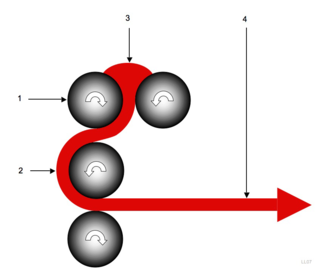Calender





Calendar is a system of organizing days for social, religious, commercial, or administrative purposes. This is done by giving names to periods of time, typically days, weeks, months, and years. A date is the designation of a single, specific day within such a system. A calendar is also a physical record (often paper) of such a system. A calendar can also mean a list of planned events, such as a court calendar or a partly or fully chronological list of documents, such as a calendar of wills.
Types of Calendars[edit]
Calendars fall into several types, mainly based on their use and the nature of the system they use to divide and name periods of time.
Lunar Calendars[edit]
A lunar calendar is based on the moon's lunar phases. It is used in many cultures to determine important dates such as festivals and holidays. Examples include the Islamic calendar and the Hebrew calendar.
Solar Calendars[edit]
A solar calendar is based on the position of the Earth in its orbit around the Sun. This affects the apparent position of the Sun in the sky in a cycle that repeats every year. The Gregorian calendar, currently used by most of the world, is a solar calendar.
Lunisolar Calendars[edit]
Lunisolar calendars are a combination of lunar and solar systems. They use months based on lunar phases but add an extra month occasionally to synchronize with the solar year. The Chinese calendar and the Hindu calendar are examples of lunisolar calendars.
History[edit]
The history of calendars is a complex and varied subject. Different cultures have developed their own systems and methods for keeping time over the millennia. The Roman calendar, which evolved into the Julian calendar and subsequently the Gregorian calendar, is just one example of this evolution.
Gregorian Calendar[edit]
The Gregorian calendar is the calendar used by most of the world today. It was first introduced by Pope Gregory XIII in 1582, as a modification of the Julian calendar. The main purpose of the Gregorian calendar reform was to change the date of Easter. In the Julian calendar, the date of Easter moved away from the spring equinox because of the inaccuracy in the Julian system of leap years.
Calendar Systems[edit]
Different cultures and societies have developed their own systems for organizing days. These systems often begin with the founding of a culture or other significant events. For example, the Islamic calendar counts years from the Hijra, the migration of Muhammad from Mecca to Medina.
Cultural and Religious Calendars[edit]
Many cultures and religions have their own calendars, which are used to mark significant dates and events. The Jewish calendar, for example, is used to determine the dates of religious holidays such as Passover and Yom Kippur. The Islamic calendar is used to determine the proper days of Islamic holidays and rituals, such as the annual period of fasting called Ramadan.
Conclusion[edit]
Calendars are an integral part of human society, providing a structured framework for the passage of time. They allow us to plan for the future, remember the past, and celebrate the present. Despite the wide variety of calendars that have been used throughout history, their core purpose remains the same: to organize time in a way that is meaningful and useful for the society that uses them.
Ad. Transform your life with W8MD's Budget GLP-1 injections from $75


W8MD offers a medical weight loss program to lose weight in Philadelphia. Our physician-supervised medical weight loss provides:
- Weight loss injections in NYC (generic and brand names):
- Zepbound / Mounjaro, Wegovy / Ozempic, Saxenda
- Most insurances accepted or discounted self-pay rates. We will obtain insurance prior authorizations if needed.
- Generic GLP1 weight loss injections from $75 for the starting dose.
- Also offer prescription weight loss medications including Phentermine, Qsymia, Diethylpropion, Contrave etc.
NYC weight loss doctor appointmentsNYC weight loss doctor appointments
Start your NYC weight loss journey today at our NYC medical weight loss and Philadelphia medical weight loss clinics.
- Call 718-946-5500 to lose weight in NYC or for medical weight loss in Philadelphia 215-676-2334.
- Tags:NYC medical weight loss, Philadelphia lose weight Zepbound NYC, Budget GLP1 weight loss injections, Wegovy Philadelphia, Wegovy NYC, Philadelphia medical weight loss, Brookly weight loss and Wegovy NYC
|
WikiMD's Wellness Encyclopedia |
| Let Food Be Thy Medicine Medicine Thy Food - Hippocrates |
Medical Disclaimer: WikiMD is not a substitute for professional medical advice. The information on WikiMD is provided as an information resource only, may be incorrect, outdated or misleading, and is not to be used or relied on for any diagnostic or treatment purposes. Please consult your health care provider before making any healthcare decisions or for guidance about a specific medical condition. WikiMD expressly disclaims responsibility, and shall have no liability, for any damages, loss, injury, or liability whatsoever suffered as a result of your reliance on the information contained in this site. By visiting this site you agree to the foregoing terms and conditions, which may from time to time be changed or supplemented by WikiMD. If you do not agree to the foregoing terms and conditions, you should not enter or use this site. See full disclaimer.
Credits:Most images are courtesy of Wikimedia commons, and templates, categories Wikipedia, licensed under CC BY SA or similar.
Translate this page: - East Asian
中文,
日本,
한국어,
South Asian
हिन्दी,
தமிழ்,
తెలుగు,
Urdu,
ಕನ್ನಡ,
Southeast Asian
Indonesian,
Vietnamese,
Thai,
မြန်မာဘာသာ,
বাংলা
European
español,
Deutsch,
français,
Greek,
português do Brasil,
polski,
română,
русский,
Nederlands,
norsk,
svenska,
suomi,
Italian
Middle Eastern & African
عربى,
Turkish,
Persian,
Hebrew,
Afrikaans,
isiZulu,
Kiswahili,
Other
Bulgarian,
Hungarian,
Czech,
Swedish,
മലയാളം,
मराठी,
ਪੰਜਾਬੀ,
ગુજરાતી,
Portuguese,
Ukrainian


